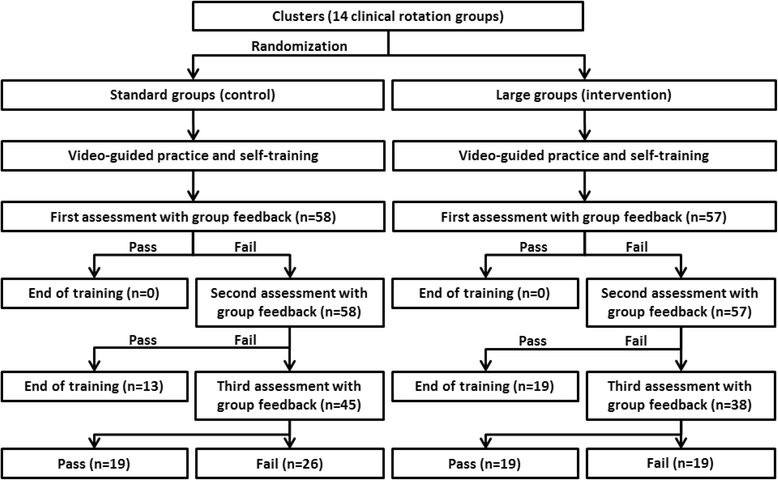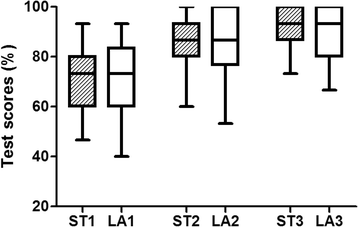The effect of peer-group size on the delivery of feedback in basic life support refresher training: a cluster randomized controlled trial
- PMID: 27378162
- PMCID: PMC4932763
- DOI: 10.1186/s12909-016-0682-5
The effect of peer-group size on the delivery of feedback in basic life support refresher training: a cluster randomized controlled trial
Abstract
Background: Students are largely providing feedback to one another when instructor facilitates peer feedback rather than teaching in group training. The number of students in a group affect the learning of students in the group training. We aimed to investigate whether a larger group size increases students' test scores on a post-training test with peer feedback facilitated by instructor after video-guided basic life support (BLS) refresher training. Students' one-rescuer adult BLS skills were assessed by a 2-min checklist-based test 1 year after the initial training.
Methods: A cluster randomized controlled trial was conducted to evaluate the effect of student number in a group on BLS refresher training. Participants included 115 final-year medical students undergoing their emergency medicine clerkship. The median number of students was 8 in the large groups and 4 in the standard group. The primary outcome was to examine group differences in post-training test scores after video-guided BLS training. Secondary outcomes included the feedback time, number of feedback topics, and results of end-of-training evaluation questionnaires.
Results: Scores on the post-training test increased over three consecutive tests with instructor-led peer feedback, but not differ between large and standard groups. The feedback time was longer and number of feedback topics generated by students were higher in standard groups compared to large groups on the first and second tests. The end-of-training questionnaire revealed that the students in large groups preferred the smaller group size compared to their actual group size.
Conclusions: In this BLS refresher training, the instructor-led group feedback increased the test score after tutorial video-guided BLS learning, irrespective of the group size. A smaller group size allowed more participations in peer feedback.
Keywords: Basic life support; Cardiac arrest; Cardiopulmonary resuscitation; Educational assessment; Feedback; Instructor; Medical education; Training; Undergraduate medical education.
Figures


Similar articles
-
Pre-training evaluation and feedback improved skills retention of basic life support in medical students.Resuscitation. 2013 Sep;84(9):1274-8. doi: 10.1016/j.resuscitation.2013.04.017. Epub 2013 May 9. Resuscitation. 2013. PMID: 23665155 Clinical Trial.
-
Does video feedback analysis improve CPR performance in phase 5 medical students?BMC Med Educ. 2016 Aug 12;16(1):203. doi: 10.1186/s12909-016-0726-x. BMC Med Educ. 2016. PMID: 27519273 Free PMC article.
-
Pre-training evaluation and feedback improve medical students' skills in basic life support.Med Teach. 2011;33(10):e549-55. doi: 10.3109/0142159X.2011.600360. Med Teach. 2011. PMID: 21942491 Clinical Trial.
-
Peer-led training and assessment in basic life support for healthcare students: synthesis of literature review and fifteen years practical experience.Resuscitation. 2012 Jul;83(7):894-9. doi: 10.1016/j.resuscitation.2012.01.013. Epub 2012 Jan 26. Resuscitation. 2012. PMID: 22285723 Review.
-
Nurses' knowledge and skill retention following cardiopulmonary resuscitation training: a review of the literature.J Adv Nurs. 2005 Aug;51(3):288-97. doi: 10.1111/j.1365-2648.2005.03491.x. J Adv Nurs. 2005. PMID: 16033596 Review.
Cited by
-
Critical Appraisal of Emergency Medicine Educational Research: The Best Publications of 2016.AEM Educ Train. 2018 Dec 14;3(1):58-73. doi: 10.1002/aet2.10203. eCollection 2019 Jan. AEM Educ Train. 2018. PMID: 30680348 Free PMC article.
-
Exploring Optimal Group Sizes for Learning in Medical Simulation: A Systematic Review.J Med Educ Curric Dev. 2025 Apr 3;12:23821205251327287. doi: 10.1177/23821205251327287. eCollection 2025 Jan-Dec. J Med Educ Curric Dev. 2025. PMID: 40190840 Free PMC article. Review.
-
Influence of pretesting and a near peer sharing real life experiences on CPR training outcomes in first year medical students: a non-randomized quasi-experimental study.BMC Med Educ. 2022 Jun 6;22(1):434. doi: 10.1186/s12909-022-03506-4. BMC Med Educ. 2022. PMID: 35668395 Free PMC article.
-
Teaching basic life support for medical students: Assessment of learning and knowledge retention.J Educ Health Promot. 2023 Jun 30;12:218. doi: 10.4103/jehp.jehp_1045_22. eCollection 2023. J Educ Health Promot. 2023. PMID: 37546014 Free PMC article.
-
Pre-clinical medical student cardiac point-of-care ultrasound curriculum based on the American Society of Echocardiography recommendations: a pilot and feasibility study.Pilot Feasibility Stud. 2021 Sep 14;7(1):175. doi: 10.1186/s40814-021-00910-3. Pilot Feasibility Stud. 2021. PMID: 34521479 Free PMC article.
References
-
- ERC Course Rules. European Resuscitation Council Website. https://faq.erc.edu/docs/erc_course_rules_VF20150320.pdf. Accessed May
-
- Providers Classroom Course & Materials: Frequently Asked Questions. American Heart Association Website. http://www.heart.org/idc/groups/heart-public/@wcm/@ecc/documents/downloa.... Accessed 10 May 2015.
Publication types
MeSH terms
LinkOut - more resources
Full Text Sources
Other Literature Sources
Medical

